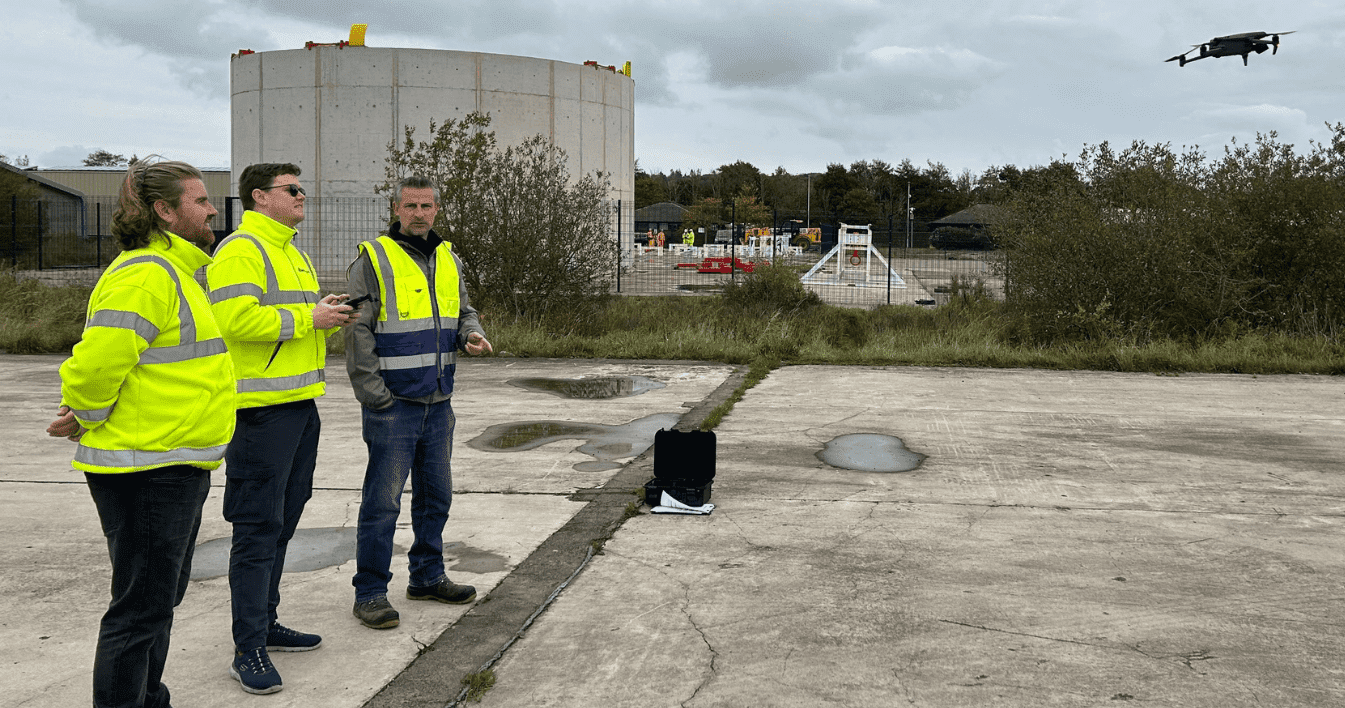A team of drone operators from Sellafield has become the first cohort to complete the Engineering Construction Industry Training Board’s (ECITB) new Foundation Unmanned Aircraft Systems (UAS) training course.
The nuclear facility in Cumbria started using drones over five years ago to make inspections “safer and faster”, and since then it has carried out hundreds of flights checking assets on site.
All its pilots sit the General Visual Line of Sight Certificate (GVC) course, but Sellafield wanted something more specific for industrial settings. It joined an ECITB working group that helped instigate the creation of industry-wide standards for the use of unmanned aircraft on sites.
After the course was officially launched earlier this year, Sellafield was first to sign up to train its team of drone operators.
Approved Training Provider Global Drone Training put on the week-long course at Sellafield’s Engineering Centre of Excellence in Cleator Moor, which involved a mixture of theory-based work and practical flying.
Amanda Smith, UAV Equipment Programme Lead at Sellafield, said: “Unmanned aerial vehicles (UAVs) have now become the standard method for remote inspections at Sellafield.
“Even though it meant taking a week out of a very busy flying schedule to put the team through the course, in the long run it helps make inspections safer and faster. The course builds on what they’ve got from the GVC with vital experience and skills for flying on industrial sites.
“At Sellafield, we always go over and above. When you’re flying drones over a nuclear site you need to understand how people are trained and their skill level. Having this new standard means if someone comes to us with this ECITB qualification, I understand the standard of the training they’ve got, which saves time on internal assessments.”
Keeping people away from harm
Industry becoming more aware of the advantages of drones has led to an increased demand for pilots who have the specific knowledge and skills to fly in industrial settings.
The ECITB’s new course, created in collaboration with the UK Drone Association, ARPAS-UK, provides an understanding of drone functionality and how to conduct operations on industrial sites safely, effectively and efficiently.
For Amanda’s team in the Remote Technologies Group, which manages Sellafield’s fleet of UAVs, remote-operated vehicles (ROVs) and robotics, the work it does “is all about keeping people away from harm”.
In the first six months of this year, there were 100 asset inspections and 150 upskilling flights carried out at Sellafield by its team of operators, who won an award for innovation at the first ever Nuclear Manufacturing Awards in October.
Amanda added: “It’s about keeping people from harm in the first instance. If we can minimise people entering high dose areas or working at height for inspections, that is a big win.
“Drones allow us to accelerate programmes. We have a large site and waiting to scaffold jobs can result in plant downtime. We can avoid that by using drones to inspect assets and get details over to engineers to make quicker decisions.”
Course ‘representative of scenarios’
Sellafield also put a member of its Emergency Duty Team (EDT) through the course to see if the rest of the cohort would benefit.
Tom Calverley, Radiometric Physicist at Sellafield, is on the EDT and was part of a trial to explore the possibility of attaching a rad sensor to a drone to measure radiation as Sellafield looks to tap into the “massive potential” of UAVs.
“I did the GVC training and the ECITB course seemed like the next logical step as the flight skills you need at Sellafield are more advanced,” said Tom, who has been at Sellafield for two years, having completed its graduate scheme.
“This course is representative of the scenarios you might get on site. You also get that good level of crossover between the drone world and industry, which gives you that awareness about the capabilities of what drones can do to help us work safer and faster on site.”
Find out more about the ECITB Foundation UAS Course
Case study: I went from novice to flying over volcanoes thanks to ECITB course





